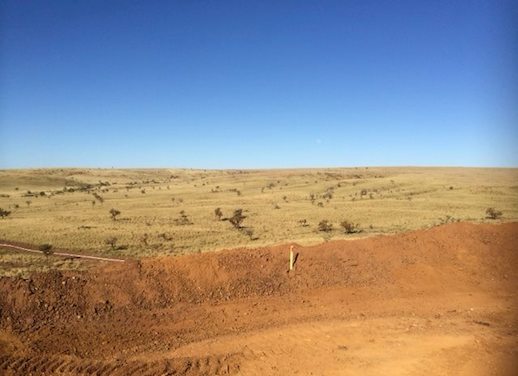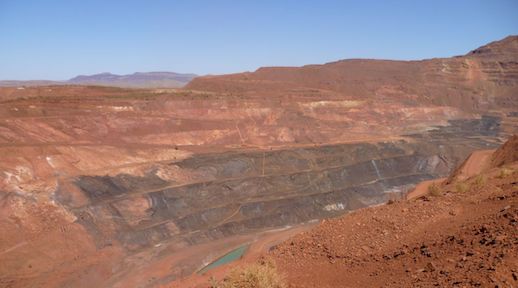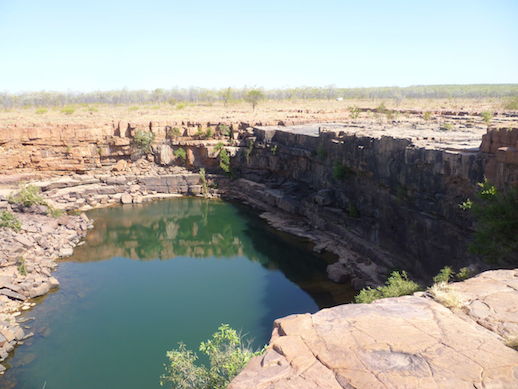Words and pictures: Peter Papathanasiou
I approached my first trip to Australia’s northwest corner with trepidation. It was the land that time forgot and where just about everything could kill you. Snakes curled up like land mines, filled with poison, neurotoxins and blood coagulants. The outback dusk carried spores, the white wedge in the lungs, fungal pneumonia. Perspiration was essential. Not sweating meant a greater risk of heat stroke. With daily temperatures well in excess of fifty Celsius, it was not going to be a problem. But my local guide Jack had reassured me over the phone. He also promised me beauty like I’d never seen before.
The flight up from Perth offered a bird’s eye view of the changing Western Australian landscape. Around the southern capital, the checkerboard fields of crops and multi-coloured wildflowers soon gave way to a fluorescent yellow sea of blooming canola. A half hour later, the Mid West region appeared in all its barren glory. Arid, empty, it was the transition region where commodities retreated from aboveground to subterranean. The only things left behind on the surface were dashed dreams and sick livestock. As we flew further north, the Pilbara came into view, salt pans and rocky outcrops stretched to every horizon. Eventually, the earth was nothing more than a noise of dirt: grey dirt, orange dirt, red dirt, and a spattering of hardy trees, lonely white ghost gums that defiantly challenged the sun and wind. Dead trees, trees of iron, with bare branches extending fuck-you fingers to jeer the cloudless sky.
Under a vast emptiness once disregarded by Dutch sailors as useless, an enormous mineral wealth now fueled an almighty financial boom. An expanse that once only supported a few indigenous nomads now bolstered hundreds of thousands of peoples’ livelihoods by moving millions of tonnes of earth to generate billions of dollars of revenue. Off the coast, metal leviathans tapped the oil in the Indian Ocean that fueled all these industries as fire-breathing steel dragon towers announced the arrival of a burgeoning gas enterprise. Viewed from above, the giant yellow trucks and earthmovers looked like cheap children’s toys.
Landing with a jolt on the thin dirt runway at Tom Price, the Cessna taxied to the makeshift terminal. The tin shed was the only building disfiguring the otherwise virginal landscape. The roof sent ripples of heat back into the sky, visible, destabilising. The light was crisp, clear. Razor-sharp shadows fell across the sand. The midday sun felt closer than I had ever known it. My lungs were king-hit by searing hot, dry air. I shielded my eyes and looked around. I could see for miles. Not a single living thing was moving, the animals having retreated, searching for relief under whatever cast a shadow. Grassy tussocks of spinifex with their spiky tentacles littered the earth like skeletons. Dust hung in the air, red pollen that quickly formed a thick layer of discomfort. Fat blowflies assembled in squadrons to feast on my face. A detonation in the distance sent shockwaves through my calves. An amber mushroom cloud metastasised into the blue yonder.
Jack collected me in a monstrous four-wheel drive. It was covered in halogen spotlights and had a roo bar the size of Sydney Harbour Bridge. The tyres came up to my chest. He handed me a two-litre water bottle from his esky. I drained it with two cocks of the elbow and burped my satisfaction.
‘Where we headed?’ I asked.
‘Inland,’ said Jack. ‘About three hours. We’ll stop for lunch, and we should be there in time for sunset. Sit back, relax, enjoy the scenery. This here’s the wet season, everything’s green.’
Green? Tom Price was a town where the only green was the glint of an empty Victoria Bitter can by the side of the road.
‘This here’s a drinking town with a mining problem,’ Jack said.
Over the next hour, I watched the brown draughty tufts of Australia blur by, grateful for modern air conditioning. The land was dotted with anthills taller than the four-wheel drive. In the distance, the rumbling of machines shattered the silence of spinifex country. With each new explosion, each plundered truckload of dirt, somebody made another million. A red haze of dust filled the air and covered everything in its path. It penetrated closed windows and children’s lungs.
Abandoned mining pits dotted the land. The companies didn’t bother backfilling them with dirt. They just walked away, leaving a gaping divot in the face of the earth. The voids were below the natural groundwater table, so water seeped in over time, topped off during the wet season with fresh rainwater. The result was what Jack called ‘a pit lake’.
On the outskirts of the next town, I saw a band of gypsies camping in a settlement made out of clumps of termite-ridden timber, asbestos sheeting, car bodies, and old tyres. Jack grunted, said they were ‘from Eastern Europe somewhere’. They had no air conditioning and no refrigeration. Further along what seemed the only road in the area, a family of Aboriginal elders trudged west, the sun in their faces. They carried nothing other than a quiet confidence about where they came from and where they were heading.
The swimming pool in the town was encircled with barbed wire. Jack explained it was ‘to keep the blacks out’.


